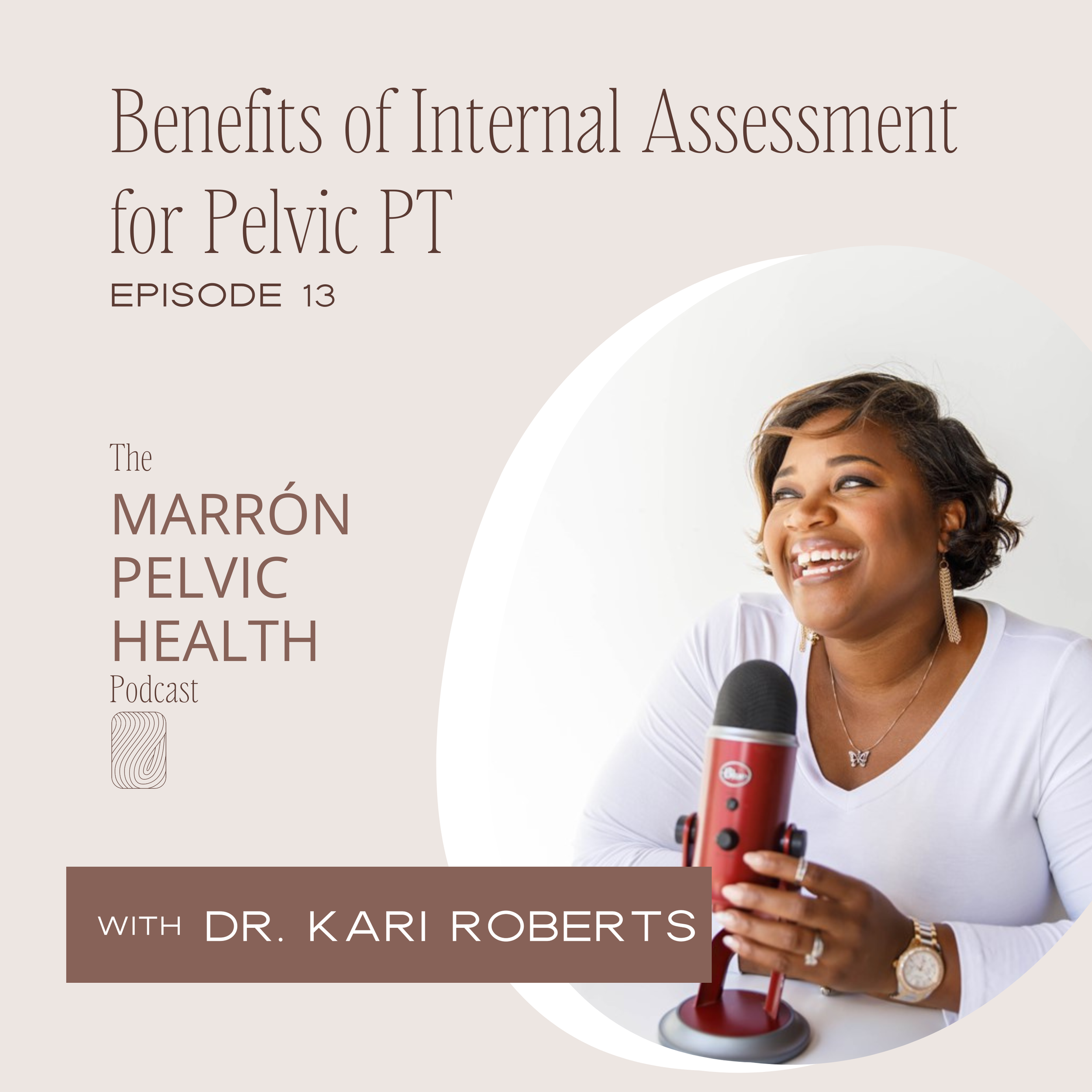How Do You Know If You Need Pelvic PT ?- Episode 14
In this episode I give you things to think about if you are considering Pelvic PT. I also go over a quick screening tool, The Cozean Pelvic Dysfunction Screening Protocol, to help you know if now is the time to seek Pelvic Physical Therapy.
Check out episode 8 to learn about the pelvic floor functions.
-
Dr. Kari: Welcome to the Morone Pelvic Health Podcast. Hi, I'm your host, Dr. Kari Roberts. On this show, we will be discussing a variety of things regarding your pelvic health. These conversations will be a mix of education, personal experiences, and a blend of tips you can apply to have a healthier pelvis. The goal of this show is to normalize conversations around pelvic health and help women stop suffering in silence.
Dr. Kari: Hello. Today I'm talking all about how do you know if you need to see a pelvic physical therapist? And first, I think it was episode five. I went back and I kind of explained the functions of the pelvic floor. So basically, if you're having an issue with one of those functions, you could have dysfunction, which means you could have pelvic physical therapy. But let's get into it a little bit more. There are a couple of different areas that the pelvic floor controls or has input on. One of them is our sexual function. Another is our bladder function. Another is our bowel function. And another is pelvic pain, any kind of pain around the pelvis. And so what I wanted to do today is go into a little bit more detail as to what that looks like, what those dysfunctions look like, and help you figure out do you need to seek out pelvic physical therapy. And then I'm also going to walk through a screening tool to really help you solidify. So by the end of this episode, you will know for sure. Do you need to look for a pelvic physical therapist? Yes or no? Okay, so let's kind of go through these buckets of function. So we've got bladder, the signs that you have bladder dysfunction or something's just not quite right. And a pelvic physical therapist can help you with if you're dealing with urgency issues. You're feeling like you have to go to the bathroom all the time. You're emptying your bladder more than every 2 hours. You're waking up more than twice a night sorry, more than once a night during bedtime. You feel the urge to go and it's so strong that it's hard for you to casually comfortably walk your way to the restroom. You have difficulty fully emptying your bladder, which means you sit down, you urinate, might have to wiggle a little to get more out, or you might stand up and feel a sudden urge to urinate. Or you might even feel drops where you're releasing urine right after you were just sitting on the commode. Those are signs that you could have dysfunction with your bladder and public physical therapy can help with those. Moving on. Oh, another one is pain. If you're having pain when you urinate or down around your bladder, that's another thing that could be an indication that you could benefit from seeing a pelvic physical therapist. Another bucket is the bowels. So if emptying your bowels is painful, if you have to actually apply pressure down there to empty your bowels. If it feels like the organs are coming out of your vagina, your urethra or your bowels, that could be of concern. That public physical therapy can help with. If you're dealing with sensation issues, sometimes people are incontinent and they don't even realize they had to have a bowel movement until they wipe and see some smearing, or they might see some smearing in their panties and then constipation. If you're having a hard time moving your bowels, you're pooping out little pebbles. You're really having to bear down the strain to empty your bowels. That could be an indication. Yes. Go to see a pelvic physical therapist. Now let's talk about sexual things. Painless, sex, that's a really broad term, and it can encompass all of those things. And all of those things could be helped with public physical therapy. So pain in and around the vagina, pain in and around the vulva, genitalial pain, pain with penetration, that could be pain with penetration, with a toy, with a penis, with your finger, with tampons, with suppository. Any of those things could be sexual dysfunction. And yes, pelvic physical therapy can help with that. The other one is things around women that is having a baby. So pregnancy, pain, postpartum recovery and all that that entails women can have any of these discomforts and problems during pregnancy. Bowel issues, bladder issues, pain. I kind of skipped over it. We'll get to it in a second. But hip pain, back pain, abdominal pain we can help with during pregnancy and after pregnancy, discomfort with getting comfortable in your own skin while you're caring for your baby, with the bending and the lifting and the caring that you have to do, we can help with that. If you've had a C section that scar, we can help you manage that scar. We can help you with the pain and the adhesions and some dysfunction that are associated with scars. We also can help you if you've got that AB separation after pregnancy or even during pregnancy, we can help you manage that. We can help you close that gap and get your function back and get stronger. And then the last section is pelvic pain. This is another really global one. You could have low back pain. You could have tailbone pain if you've ever fallen on your tailbone. That could be a sign of dysfunction that we can help with. If you have hip pain, hip Girdle pain, si joint pain, pubic synthesis pain. One thing I like to keep in mind is if you've ever had chronic low back pain, and you've gone down the medication route, and you've gotten the injections, and you've gone to traditional therapy and you've gone to the physician and you still have pain and they can't figure out what's wrong, seek out a pelvic physical therapist, because that might be the missing link to help you overcome that chronic back pain. So that's kind of an overview of what those dysfunctions are and things that we can help with. And then we're going to walk through this quiz, this screening tool. It's the closing pelvic dysfunction screening protocol. It is 123-45-6789. It's ten questions. If you say yes to three of them, that is an indication that you more than likely have pelvic floor dysfunction and you should seek out a pelvic floor physical therapist. One I sometimes have pelvic pain in the genitals, perineum, pubic or bladder area that exceeds a three on a zero to ten scale, with ten being the worst. Two, I can remember falling onto my tailbone, lower back or buttocks even as a child. Three I sometimes experience one or more of the following urinary symptoms accidental loss of urine, feeling unable to completely empty my bladder having to void within a few minutes or within a few minutes of a previous void pain or burning with urination difficulty starting or frequently stopping and starting the urine stream. Five I often or occasionally have to get up to urinate two or more times a night. Six I sometimes have a feeling of increased pelvic pressure or the sensation my pelvic organs are slipping out or falling out. Seven I have a history of pain in my low back, hip, growing, or tailbone, or have had sciatica. Seven I sometimes experience one or more of the following bowel symptoms loss of bowel control feeling unable to completely empty my bowels straining or pain with a bowel movement difficulty initiating a bowel movement. Eight I sometimes experience pain or discomfort with sexual activity or intercourse. Nine sexual activity increases one or more of my symptoms. Ten prolonged sitting increases my symptoms. So if you said yes to three or more of those from the Closing Pelvic Dysfunction Screening Protocol, I want to say tool, but it's protocol. Look for a Pelvic Health Physical Therapist if you want to talk to me, you can slide in my DMs. You can email me. Keep in mind I do provide virtual visits, so if you want to have a consultation, I would love to be able to help you overcome these things. So I hope this was helpful to answer the question of how do you know if you should go to a pelvic physical therapist? Thank you so much for tuning in and I will be back next week with another amazing episode. Thank you for listening to this episode.
Dr. KARi: Of The Moron Pelvic Health podcast. Please do me a favor and leave a review so that more people can can find this content and make sure you like and subscribe yourself so you never miss another episode.

